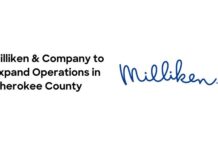The Churchwell Company has been around more than 100 years. But there’s nothing old fashioned about this family business. From the first appearance of Churchwell Brothers in the 1800s to the Churchwell Co. of today, Robert Pavelka and his forebears have managed to anticipate where the market is heading and make the necessary changes to keep up with the times.
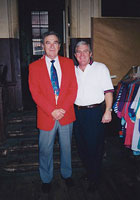 The Churchwell Co. of the 21st century is headquartered in a Jacksonville, Fla., office with a small retail space up front and warehouse in the back. It’s all part of Pavelka’s vision to keep moving into the internet age, but it’s miles away from the historic building that still appears on the company stationery and checks.
The Churchwell Co. of the 21st century is headquartered in a Jacksonville, Fla., office with a small retail space up front and warehouse in the back. It’s all part of Pavelka’s vision to keep moving into the internet age, but it’s miles away from the historic building that still appears on the company stationery and checks.
When Pavelka tells the story of his family business, one can hear a century of gentility and charm swimming in his delicate southern drawl. His grandfather, John Hamilton “Mr. J.H.” Churchwell, and his great uncle, Augustus Franklin “Mr. A.F.” Churchwell, started Churchwell Bros. originally in Cordele, Ga., in the 1800s with $100. It was the classic dry goods store seen in every black-and-white western. They sold everything from feed to cloth to sewing notions, towels, pillows and sheets. And soon they had as many as eight stores dotting Georgia. Around 1911 they decided to open up a wholesale distribution company as well under the Churchwell Bros. name.
In 1923, the brothers bought the Covington Co. warehouse in Jacksonville, Fla., from Victor Covington, who was ready to retire. Built just after the great fire of 1901, the four-story building was located on the corner of East Bay and North Market streets in downtown Jacksonville, across from the shipyards on the river. It remains a marvel of handcrafted quality, all heart pine and solid brick. 24-inch thick solid brick walls and post-and-beam construction are found throughout. In 2006, Pavelka lovingly restored the historic building and developed it into upscale condominiums called Churchwell Lofts.
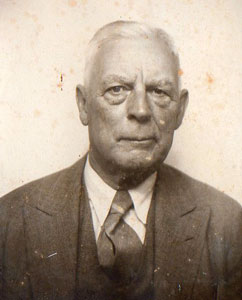 Sometime in the 1930s, the brothers decided to split up the wholesale and retail divisions. Legend has it they literally tossed a coin to see who would get the equally valued businesses. And that is how Pavelka’s grandfather, Mr. J.H., ended up with the wholesale company.
Sometime in the 1930s, the brothers decided to split up the wholesale and retail divisions. Legend has it they literally tossed a coin to see who would get the equally valued businesses. And that is how Pavelka’s grandfather, Mr. J.H., ended up with the wholesale company.
From the beginning, Churchwell Bros. did business with Red Kap and was one of Hanes’ largest distributers. Pavelka remembers his dad dealing with Gordon and Hubert Hanes directly. He says, “We carried everything they made.” Fruit of the Loom was another company in its roster, as well as Bluebell, which made Wrangler jeans. Fifteen salesmen traveled throughout the southeast and the Bahamas.
The 1960s saw the growth of major retailers such as J.C. Penney and Sears, and with them came the demise of the wholesaler due to the shrinking of small retailers. Pavelka’s father saw the changes coming and started to shift from supplying retailers to seeking government contracts at the city, county and state level. “At one point we were bidding in 37 states. We were selling to prisons and hospitals and other institutions across the country. I’m still in that business but not in the same way,” Pavelka says.
The next big evolution occurred after Pavelka had graduated from Loyola University and stayed in New Orleans for a few years working in the insurance brokerage industry. In 1980, Pavelka moved back to Jacksonville and went to work in the family wholesale business. Hanes had begun a colored T-shirt business called Hanes Printables. Early on, everybody laughed, including all the underwear people. He says, “It was just a small part of Hanes’ overall business. Who ever thought printable T-shirts were going to be any big deal?”
But of course, printable T-shirts were indeed a big deal, and Pavelka saw that when he came on board. The printable, colored T-shirts and custom-embroidered golf shirts became a large part of the company’s success at that time. From there came the development of the 100 percent cotton Beefy T at a time when T-shirts were cut to size and nobody wore big, loose clothing. Oneida and Fruit of the Loom competed, the latter by introducing the Power T named after Jackie Powers, a long-time salesman with the company. “So we got into the imprinted sportswear business in a pretty large way,” Pavelka says.
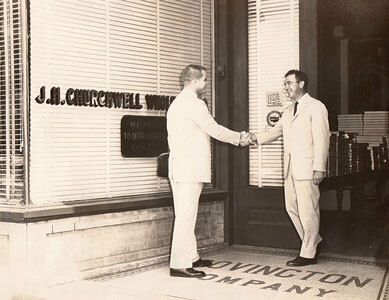 The imprinted sportswear business was 90 percent cash on delivery and cash only for a large amount of customers. But there were customers doing $50,000-$60,000 a year with Churchwell. One customer did over $10 million in three years. As Pavelka says, “How can you not believe in this?” Then they were actually making goods for that customer’s private label. “We called that division the Churchwell Imprintables.”
The imprinted sportswear business was 90 percent cash on delivery and cash only for a large amount of customers. But there were customers doing $50,000-$60,000 a year with Churchwell. One customer did over $10 million in three years. As Pavelka says, “How can you not believe in this?” Then they were actually making goods for that customer’s private label. “We called that division the Churchwell Imprintables.”
The company sold to screen printers and advertising specialty customers. It went to shows around the country, setting up 20-feet worth of booth space. It was a great business for a while, but then there wasn’t enough production in the United States. “I was lucky that I had some great contacts at a couple of mills, and I could get product when other people could not,” he says.
Then production started going offshore. Large quantities of product were being manufactured in areas such as Costa Rica to keep prices down. The margins became so low that Pavelka again had to change with the times. “At some point we decided to get out of that business,” he says. “We liquidated our inventory and decided to start dealing with the end user, although we still wholesale.”
From the beginning, Churchwell Bros. was a family business run with integrity and a strong commitment to treating people well. That philosophy is perhaps no more evident than in employee Raymond Rodgers. Pavelka has a photo of Rodgers, who began working for Churchwell Bros. at the age of 18, dating to 1921. Rodgers continued to work for the company for 70-plus years until he died at the age of 95. He continued to go out on sales calls until the age of 92. Another salesman, Jimmy Solomon, worked with the company for 54 years. Chuck Jones for more than 40 years. Lois Morgan, Pavelka’s grandfather’s secretary, was with them for more than 60 years. In those days, it was possible to make a very respectable income making sales calls. Pavelka recalls Rodgers writing half a million dollars’ worth of business per year at a time when VF Corp. was selling work pants for $2 a pair and Hanes underwear was $2.25 a dozen.
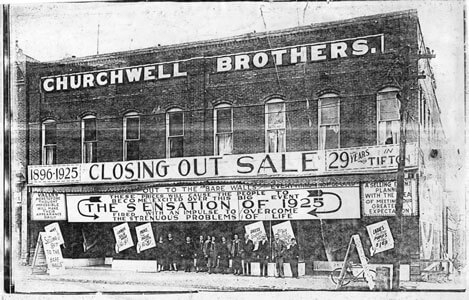 Pavelka says the company’s management philosophy could be summed up in the way Rodgers handled new employees. “Raymond would come in and say, ‘We’re glad to have you. I know it’s going to take a little while for you to get used to being here and quite honestly we’ve got to see whether you like us and whether we like you. We’re all family here but families don’t always have to get along.’ And he was right,” Pavelka says. “It was a really nice, down-to-earth way to put it. Just because it didn’t work out didn’t mean that we were bad or they were bad.”
Pavelka says the company’s management philosophy could be summed up in the way Rodgers handled new employees. “Raymond would come in and say, ‘We’re glad to have you. I know it’s going to take a little while for you to get used to being here and quite honestly we’ve got to see whether you like us and whether we like you. We’re all family here but families don’t always have to get along.’ And he was right,” Pavelka says. “It was a really nice, down-to-earth way to put it. Just because it didn’t work out didn’t mean that we were bad or they were bad.”
Rodgers’ charm came in handy as well when trying to collect on an overdue account. Pavelka says, “He’d go into a man’s store and [the man] would say, ‘Well, I’m glad you’re here Mr. Rodgers. I’ve got a list of things…’ And Raymond would say, ‘Well, I appreciate that. First off, we’ve got some invoices here with some whiskers on them.’ Raymond said, ‘If you can’t talk to a man about money, you can’t talk to him about sales.’”
One thing Pavelka can talk about is the rich history of his family. His father turned down scholarships at multiple colleges at the age of 16 to wait for an appointment to the United States Naval Academy at Annapolis. After he graduated, he served on submarines, becoming a lieutenant on the U.S.S. Rasher on water patrol in the Pacific. At the end of WWII, he was an aide to Admiral Wilkes, who commanded the Atlantic Fleet’s submarine force, and he lived in Berlin during the blockade with Pavelka’s mother, Martha Rebecca Churchwell. He resigned in 1949 to join the Churchwell Co. as a buyer and department manager. “He would’ve been a great admiral. No question,” Pavelka says.
His uncle, Paul Pavelka, truly did make history. During WWII flying for the LaFayette Escadrille, he was the first pilot to fly a night mission over Germany. Robert has seen a picture of him hanging in the aviation department of the Smithsonian Institute. There are letters he wrote to his commanding officer, along with a half-dozen books describing what it was like to fly that night mission. He says, “That’s an individual with an eighth grade education with whom people in college would have a hard time keeping up.”
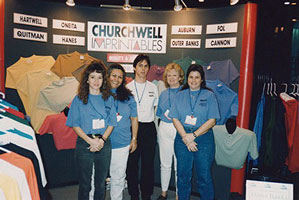 Pavelka managed to see the world from a safer perspective while developing distributors for licensed products for the National Football League, Major League Baseball and the National Hockey League. From 1992 to 1995, he would travel to Paris, London, Milan, Munich and Oslo for weeks at a time as a distributor of licensed headwear and sportswear. “It was an exciting time,” he says humbly.
Pavelka managed to see the world from a safer perspective while developing distributors for licensed products for the National Football League, Major League Baseball and the National Hockey League. From 1992 to 1995, he would travel to Paris, London, Milan, Munich and Oslo for weeks at a time as a distributor of licensed headwear and sportswear. “It was an exciting time,” he says humbly.
Today, Pavelka stays close to home, but his customer base is more diverse than ever. And in an effort to keep finding his customers wherever they may be, he sees building his online presence as a top priority. His admiration for the VF Corp. led him to UniformMarket to build his web site, www.churchwellcompany.com, and expand his reach without growing his overhead.
But his favorite part of the business remains dealing with people. And to that end, he sees his straightforward, service-oriented business style as one of his company’s biggest selling points. He quotes a saying he remembers hearing long before he came to work for the family company: “When you dealt with Churchwells, you knew what you were going to get and you were always going to be satisfied.”
While Pavelka may not be sure where the future of his business is heading, history would suggest he’ll lead it in the right direction while maintaining the legacy of quality products, exceptional service and competitive drive that have been the foundation of the Churchwell Co. for more than a century.
J.H. Churchwell Company
814 Edgewood Ave. S
Jacksonville, FL 32205
877-537-6166
www.churchwellcompany.com





